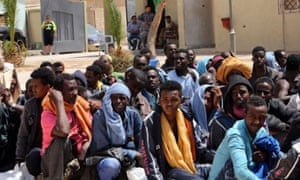Humanitarian Crises
"The fundamental point is not so much the destruction of the vessels but it is the destruction of the business model of the traffickers."
"As summer comes, more people are travelling and I'd like to have the operation in place as soon as possible."
"If you look at business models of the traffickers and the flows of money involved in trafficking, it may be that the money is financing terrorist activities."
Federica Mogherini, European Union foreign policy head
"One of the problems is that there might be foreign fighters, there might be terrorists, also trying to hide, to blend in [on smuggling vessels crossing into Europe]."
NATO Secretary General Jens Stoltenberg
"Whatever interdiction measures are taken, the boats will keep coming (or replacement boats will be bought on the open market) as long as people are being pushed out by conflict, poverty and poor governance."Leonard Doyle, spokesman, International Organization for Migration"An unintended consequence of this mission is that it may even lead to more deaths. If there is a shortage of vessels, even more people will be packed into them. There is even a possibility, given the desperate situation these people face, that they might try to construct their own boats."Michael Diedring, secretary general, European Council on Refugees and Exiles

So far, over ten thousand migrants have been plucked from the Mediterranean just in recent weeks alone, attempting to make their way from Libya to Europe. Close to 1,830 migrants have died in the attempt to reach Europe by sea this year alone, according to the International Organization for Migration. And the European Union plans to put an end to the exodus targeting Europe.
Military means are to be used to do just that, with the intention of bombing unoccupied vessels suspected of being used by human smugglers, before they embark on their migrant-teeming trips.
Britain, France, Italy and other EU nations have pledged military equipment to be made accessible for that purpose. It is, they claim, a humanitarian mission; to stop migrants from leaving Africa on a perilous journey. And in the process, needless to say, halting the movement of people looking for haven from misery, poverty, and conflict.
Intelligence gathering is to represent the first phase of the plan, including the surveillance of smuggling routes to southern Italy and Malta.That initial task completed, EU vessels would begin their chase and bombardment of the smugglers' boats. The 28-member-nation bloc awaits full legal protection that a United Nations resolution would render their plan to destroy smugglers' boats, which completes the three-step process of a solution.
There's that functional plan in the hopes of meeting success, and it is separate and apart from the EU's plan for quotas of accepted migrants to be agreed to by member states.

The plight of the Rohingya, fleeing persecution in Burma, is yet another facet of the burgeoning trade in human traffic, reflecting mass migration as people find their countries of origin intolerable to their continued life there. Malaysia and Indonesia, Muslim countries that one might imagine would be quick to welcome Muslim migrants fleeing persecution have stated they would allow migrants to remain in their territories, but for no longer than a year. Other countries should offer permanent refuge.
Labels: Africa, Conflict, Europe, Middle East, Migrants, Poverty

<< Home